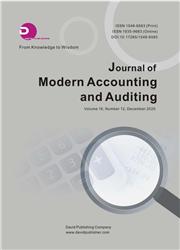The Effect of the Board of Directors and Audit Quality on Disclosure of Internal Control Practices: Evidence from European Companies
引用次数: 6
Abstract
The purpose of this paper is to examine the effect of the board of directors, namely board size, board independence, and CEO duality, as well as audit quality on the disclosure of internal control information. The sample consists of 164 European companies listed in the STOXX Europe 600. Based on positive agency theory, the authors posit that board of directors and audit quality influence corporate internal control disclosure practice. The content analysis and the design of the evaluation criterion were used to calculate the disclosure index of internal control. Thus, multiple regression analysis is utilized to analyze the results of this paper. The average internal control information disclosure index was 0.285, indicating that most of the companies in our sample do not disclose enough information about the internal control. This low level of forward-looking information disclosure makes it very difficult for corporate stakeholders to determine the future performance of the company. Multivariate results indicate that internal control disclosure is positively and significantly associated with board independence, CEO duality, and audit quality. This study contributes to the literature on the various governance characteristics and disclosure by showing that the disclosure of internal control information in European countries is positively and significantly associated with board independence, separation of duties, and audit quality. Our study was based on a sample of European companies including countries regulating IC disclosure as well as unregulated settings. As noted by Bedard and Graham (2014), regulatory differences in countries can contribute insights on the costs and benefits of disclosure. Findings also have policy implications for investors, managers, and regulators.董事会和审计质量对内部控制实务披露的影响——来自欧洲公司的证据
本文旨在考察董事会规模、董事会独立性、CEO二元性以及审计质量对内部控制信息披露的影响。样本包括164家在STOXX Europe 600中上市的欧洲公司。基于正代理理论,笔者认为董事会和审计质量会影响公司内部控制披露实践。采用内容分析法和评价准则设计法对内部控制披露指标进行了计算。因此,采用多元回归分析方法对本文的结果进行分析。平均内部控制信息披露指数为0.285,表明我们样本中的大多数公司没有披露足够的内部控制信息。这种低水平的前瞻性信息披露使企业利益相关者很难确定公司的未来业绩。多元分析结果表明,内部控制披露与董事会独立性、CEO二元性和审计质量呈正相关。本研究表明,欧洲国家的内部控制信息披露与董事会独立性、职责分离和审计质量呈正相关,这对有关各种治理特征和披露的文献做出了贡献。我们的研究基于欧洲公司的样本,包括监管IC披露的国家和不受监管的环境。正如Bedard和Graham(2014)所指出的,各国的监管差异有助于深入了解披露的成本和收益。调查结果对投资者、管理者和监管机构也有政策意义。
本文章由计算机程序翻译,如有差异,请以英文原文为准。
求助全文
约1分钟内获得全文
求助全文

 求助内容:
求助内容: 应助结果提醒方式:
应助结果提醒方式:


